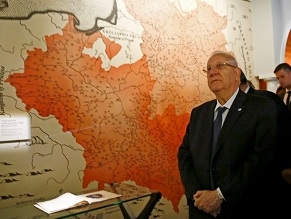|
World Jewish News

President Reuven Rivlin visits newly built Museum of the History of Polish Jews in Warsaw October 28, 2014.. (photo credit:REUTERS)
|
Rivlin in Warsaw: Saga of the Jews did not begin in Poland nor did it end in Auschwitz
29.10.2014, History Calling it “not a Holocaust museum, but a museum of life,” President Reuven Rivlin attended the opening of the Museum of the History of Polish Jews in Warsaw on Tuesday alongside Polish President Bronislaw Komorowski.
Rivlin described Poland as the place that nurtured the creative soul of the Jewish people.
“To our great sorrow, it is also the largest graveyard of the Jewish people,” he said.
“This was the birthplace of the shtetl, and this is where it died,” he continued, speaking of the Nazis herding the Jews of Poland into ghettos, the Warsaw Ghetto Uprising, the heroism of the fighters, and the Jews marching to their deaths wearing prayer shawls and yellow stars.
Rivlin said he was representing not just himself, but “an entire nation – a nation whose collective journey delves deep into the foundations of Jewish and human existence and into the depths of evil. As a Jew, even if you were not born in Poland, the very name, Poland, gives rise to a shuddering in your body and a longing in your heart.”
Even though Jews were removed from Poland, he said, Poland was not removed from the Jews.
“We cannot erase history, a history so rich, so painful,” he said.
The museum, he went on, was created to reflect the history of the Jews of Poland from every perspective.
“It is not a Holocaust museum, it is a museum of life. It is a place that commemorates what was, what will never be again, and the hope for a different future,” he said.
Rivlin also referenced the Jedwabne pogrom that the Poles carried out in July 1941. He commended the Poles for their courage in soul-searching and their ability to confront the past.
Although Poland occupies a significant place in Jewish history, Rivlin made it clear that the saga of the Jewish people did not begin in Warsaw, nor did it end in Auschwitz.
“The saga of the Jewish people began in the land of Israel, and it will always remain in Israel against all odds,” he declared.
Rivlin also eschewed the common belief that Israel was established to compensate for the Holocaust.
“Those who believe this are mistaken,” he asserted. “To believe this is a gross mistake.
The state of Israel was created not as a compensatory measure, but as a right.”
Still, he went on, there remains an awareness of the danger of anti-Semitism.
“The State of Israel will pursue Auschwitz and what it symbolizes,” he said. “We build our future, eyes wide open and alert.
We do not belittle threats. We will not belittle shameful statements calling for the genocide of the Jewish people. The Holocaust continues to serve as a warning sign against non-banal evil.”
Komorowski, meanwhile, said that “we cannot understand the history of Poland without the great contribution of its Jews to Polish culture.”
He noted that Polish Jews had also been pioneers in the creation of the State of Israel, and that more than half the members of the first Knesset spoke Polish. As such, he said, he was delighted that the Jewish state’s president could join him in opening the museum.
During the ceremony, Rivlin laid a wreath on the street at the entrance to the museum in memory of those who fought in the Warsaw Ghetto Uprising.
JPost.com
|
|
